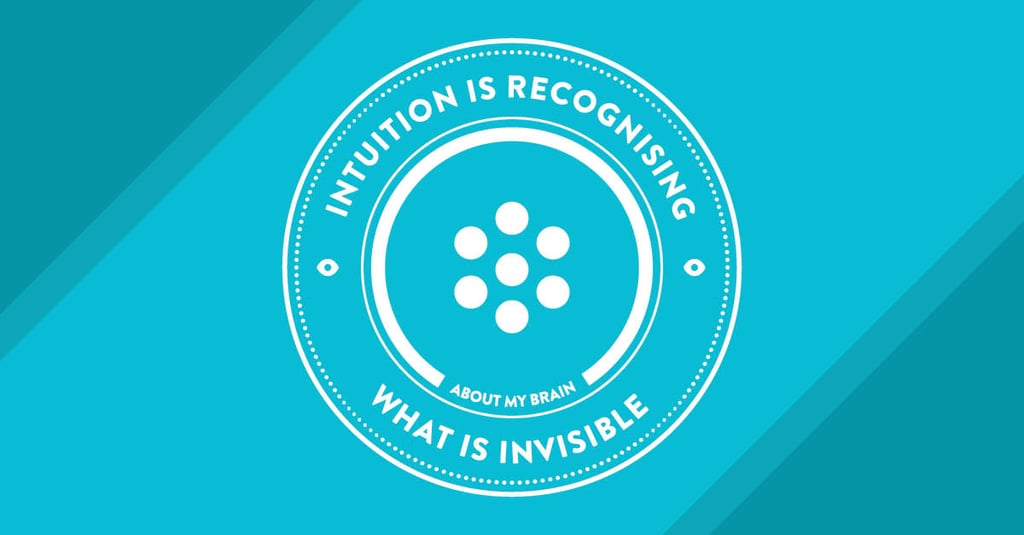Intuition - Why It's Time To Listen To Our Third Brain!
General Colin Powell is widely acknowledged as an excellent military and political leader. He invokes a rule around decision-making where P = 40-70. P is the probability of success and 40-70 the percentage of information required to make a decision.
Where a leader has less than 40% of information, his rule says they are taking undue risk. But when they’ve reached that sweet spot between 40 and 70 percent, they need to act. Using the information they ‘know’ and following their intuition they must make their decision. This is where the most effective leaders operate. It’s not just about the facts, but also about harnessing our gut instinct.
Waiting until there is more data is too slow – both in a military context and also a fast-moving, complex and uncertain business landscape. We need to be innovative and agile. We have to empower and trust our intuition as never before.
As acclaimed actor, academic and scientist Alan Alda states:
You have to leave the city of your comfort and go into the wilderness of your intuition. What you’ll discover will be wonderful. What you’ll discover is yourself.
How Intuition Fits In Our Leadership Model
Intuition is one of the 16 pillars of the i4 Neuroleader Model. It sits within the competency of Agility. As I unpack in the ‘Agility’ post, the 4 pillars are:
- Intuition
- Awareness
- Influence
- Adaptability
The 3 Elements Of Intuition
Intuition refers to the ability to know something without the involvement of conscious reasoning.
Intuitive Insights
In organisations, rational thinking and analysis have been the primary drivers of setting strategy and making business calls. Going on an intuition-based or ‘gut call’ is seen as high risk – for both the business and the plucky executive.
Failure based on analysis can be defended, but, in many cultures, intuition-based calls leave individuals exposed. We all have the capacity to intuit and connect the intelligence of our hearts and guts. If we didn’t, the very notion of intuition would be hard to understand – but it’s not. We all experience feelings and ‘knowing’ that we can’t empirically explain.
Having the courage to tap into this resource is key. Leaders who give themselves and others permission to connect with their intuition are better-positioned to deal with the uncertainty of our VUCA world. Intuitive leaders are good at recognising patterns and joining the dots. By treating their intuition as an equally valid input as data or logic, they are able to lead more confidently – even when they don’t know the final destination (which is often the situation today).
Decision-Making
Most of us have had the sensation of arriving home after a drive with no recollection of the journey. Subconsciously, we will have made thousands of small decisions to do with positioning the car, starting, stopping and steering. Similarly, musicians are able to play whilst chatting or unthinkingly join in playing their part in a new song. In the background, we are constantly making decisions without being aware of them.
Despite multiple neuroscience studies that have proved that decisions are not purely the domain of the rational mind, in organisations we are loathe to trust what we can not ‘see’. The following quote by Albert Einstein, whilst disputed, makes the point wonderfully:
The intuitive mind is a sacred gift and the rational mind is a faithful servant. We have created a society that honours the servant and has forgotten the gift.
In our increasingly unpredictable world, leaders must learn to trust and take advantage of all available forms of information. As we saw with Colin Powell, he not only encourages leaders to utilise their intuition, he says not to do so (to wait for more complete information) is poor leadership. It’s too slow - and speed is a business and leadership imperative. It is no use being right, but late if the competition has got there before you!
Sense of ‘Knowing’
Within the new field of neuro-gastroenterology, doctors are focusing on studying the gut, the brain and their interactions, mainly to better understand gastrointestinal disorders. This renewed interest in the gut – now called the second brain – is also giving us better information on how the nervous system and our 100 million gut neurons interact to produce the feelings of ‘knowing’ or ‘gut instinct’ that we all experience regularly.
This is showing up in the leadership world. Behavioural modellers and neuro-linguistic programming experts Marvin Oka and Grant Soosalu have devised a new coaching methodology based on learning how to integrate all three neural networks, known as the ‘three brains’: head, heart and gut. At last, we are creating frameworks and organisational conversations that acknowledge and leverage all parts of our biology.
How’s Your Intuition?
For too long, we have selected our leaders and based leadership decisions around our immensely powerful but incomplete conscious, rational brain. We’ve always known and felt other positive ‘forces’ in our intuition.
But these were labelled as unreliable, random or simply imagined. We now know that intuition is proven. As leaders we must now learn to add it to the balance of inputs that we need to succeed. In challenging times, it’s likely to be the difference.
- i4 Neuroleader (353)
- Leadership & Culture (336)
- Brain Health & Wellbeing (206)
- Innovation (97)
- Performance (85)
- Our News (79)
- Collaboration (68)
- Agility (53)
- Practitioner Stories (44)
- In The Press (36)
- Make Me A Leader (33)
- Balance (31)
- Integration (30)
- Imagination (29)
- Awareness (23)
- Brain-Friendly Channel (22)
- Brain-Friendly Leadership (22)
- Communication (22)
- Curiosity (21)
- Inspiration (19)
- Intuition (19)
- Attitude (17)
- Courage (16)
- Adaptability (14)
- Case Studies (14)
- Drive (14)
- Generosity (13)
- Ethics (9)
- Mental Readiness (9)
- Influence (8)
- Retreat (8)
- Brain-Friendly Leadership (1)
- Oracle Cards (1)
- 1 November 2025 (2)
- 1 September 2025 (3)
- 1 August 2025 (5)
- 1 July 2025 (5)
- 1 June 2025 (2)
- 1 April 2025 (1)
- 1 March 2025 (8)
- 1 February 2025 (3)
- 1 September 2024 (4)
- 1 July 2024 (2)
- 1 June 2024 (6)
- 1 May 2024 (2)
- 1 April 2024 (3)
- 1 March 2024 (1)
- 1 November 2023 (1)
- 1 August 2023 (1)
- 1 July 2023 (2)
- 1 June 2023 (2)
- 1 May 2023 (4)
- 1 April 2023 (2)
- 1 March 2023 (7)
- 1 February 2023 (4)
- 1 January 2023 (1)
- 1 September 2022 (1)
- 1 May 2022 (3)
- 1 April 2022 (1)
- 1 March 2022 (5)
- 1 February 2022 (4)
- 1 January 2022 (4)
- 1 December 2021 (2)
- 1 November 2021 (4)
- 1 October 2021 (3)
- 1 September 2021 (6)
- 1 August 2021 (1)
- 1 April 2021 (1)
- 1 December 2020 (2)
- 1 November 2020 (1)
- 1 September 2020 (1)
- 1 August 2020 (1)
- 1 July 2020 (3)
- 1 June 2020 (4)
- 1 May 2020 (3)
- 1 April 2020 (4)
- 1 March 2020 (6)
- 1 February 2020 (4)
- 1 January 2020 (2)
- 1 December 2019 (3)
- 1 November 2019 (3)
- 1 October 2019 (5)
- 1 September 2019 (4)
- 1 August 2019 (4)
- 1 July 2019 (4)
- 1 June 2019 (5)
- 1 May 2019 (9)
- 1 April 2019 (9)
- 1 March 2019 (8)
- 1 February 2019 (7)
- 1 January 2019 (8)
- 1 December 2018 (5)
- 1 November 2018 (10)
- 1 October 2018 (16)
- 1 September 2018 (9)
- 1 August 2018 (10)
- 1 July 2018 (9)
- 1 June 2018 (8)
- 1 May 2018 (9)
- 1 April 2018 (9)
- 1 March 2018 (9)
- 1 February 2018 (8)
- 1 January 2018 (8)
- 1 December 2017 (6)
- 1 November 2017 (9)
- 1 October 2017 (9)
- 1 September 2017 (8)
- 1 August 2017 (10)
- 1 July 2017 (8)
- 1 June 2017 (8)
- 1 May 2017 (9)
- 1 April 2017 (8)
- 1 March 2017 (6)
- 1 January 2017 (3)
- 1 December 2016 (4)
- 1 November 2016 (5)
- 1 October 2016 (4)
- 1 September 2016 (2)
- 1 August 2016 (4)
- 1 July 2016 (4)
- 1 June 2016 (2)
- 1 May 2016 (3)
- 1 April 2016 (3)
- 1 March 2016 (7)
- 1 February 2016 (2)
- 1 January 2016 (5)
- 1 December 2015 (2)
- 1 November 2015 (2)
- 1 October 2015 (4)
- 1 September 2015 (2)
- 1 August 2015 (2)
- 1 July 2015 (1)
- 1 June 2015 (3)
- 1 May 2015 (4)
- 1 April 2015 (5)
- 1 March 2015 (3)
- 1 February 2015 (3)
- 1 January 2015 (3)
- 1 December 2014 (3)
- 1 November 2014 (3)
- 1 October 2014 (3)
- 1 September 2014 (5)
- 1 August 2014 (4)
- 1 July 2014 (5)
- 1 June 2014 (3)
- 1 May 2014 (1)
- 1 March 2014 (1)
- 1 December 2013 (2)
- 1 November 2013 (1)
- 1 July 2013 (1)
- 1 June 2013 (1)
- 1 May 2013 (3)
- 1 April 2013 (1)
- 1 March 2013 (2)
- 1 February 2013 (1)
- 1 January 2013 (2)
- 1 November 2012 (1)
- 1 October 2012 (1)
- 1 September 2012 (1)
- 1 August 2012 (2)
- 1 July 2012 (1)
- 1 June 2012 (1)
- 1 May 2012 (2)
- 1 April 2012 (1)
- 1 February 2012 (1)
- 1 January 2012 (1)
- 1 November 2011 (1)
- 1 October 2011 (3)
- 1 September 2011 (2)
- 1 July 2011 (1)
- 1 June 2011 (1)
- 1 May 2011 (1)
- 1 April 2011 (1)
- 1 March 2011 (1)
- 1 February 2011 (2)
- 1 January 2011 (4)
- 1 December 2010 (4)
- 1 November 2010 (3)
- 1 October 2010 (5)
- 1 September 2010 (4)
- 1 August 2010 (4)
- 1 July 2010 (3)
- 1 June 2010 (4)
- 1 May 2010 (7)
- 1 April 2010 (5)
Subscribe by email
You May Also Like
These Related Stories

The Neurobiology of Intuition - Becoming an Agile Leader

Intuition: An Advisor On Your Team





No Comments Yet
Let us know what you think